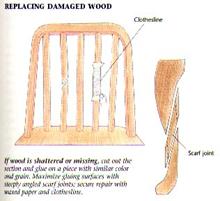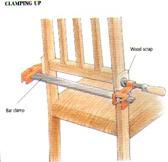Why Upholster by M.T. Baldwin
Recover or Re-upholster?
If a sofa or chair is in good shape on the inside and all it
needs is a fresh new fabric on the outside, that's recovering.
When a piece needs work on the inside, either partially or
totally (new webbing, re-tied springs, new fillings,
re-cushioning) that's reupholstering. Both are the province of
the upholsterer, marine fabricator or auto trimmer.
The upholsterer works from the frame, up... much the way the
furniture maker does. So, if your old piece has a good frame,
there's some significant initial saving to be had. Using
modern materials with traditional skills can provide you with
results that are even better than the original. In the hands
of a good professional, you can get a full measure of value
for your money, and quality that's hard to match.
Re-upholstery or restoration is one of the few professions in
the domain of the hand skills that is alive and well in the
assembly line age. So, if you have a lumpy old sofa, or a
frayed chair that's beginning to shed its stuffing, take
another look before dismissing it as a "has been". It could be
the beginning of a beautiful new piece. This recycling of
quality furniture will bring much pleasure in seeing a
fashionable new piece bounce back out of the old one.
If your old sofa (or chair) frame has stood up for ten years
or more, it's probably good or it wouldn't have lasted that
long. Good frames don't wear out. Over the years a good wood
frame has jumped 100% OR MORE IN PRICE.
Hardwood, The Key to a Quality Frame
Good frames are made of hardwood - oak, maple, ash, alder or
mahogany. These woods are strong and enduring and the
upholsterer can tell them by their weight. They're heavy!
That's why salespeople will often lift up one end of a sofa 98
when showing it to a customer. They are indicating a quality
feature of the furniture, which is the frame's weight. You can
do some testing yourself by lifting pieces similar to your own
and comparing to see how they feel
Good Frame Construction
Good frames are joined with double dowels (wood pins) and wood
blocks, or screws. These hold fast and firm for a long time.
If and when they loosen, they're easily firmed up or replaced.
Frames made with metal braces, and those where staples are
used without dowels, are generally not the best. The wood used
in such frames is usually of lesser quality and doesn't wear
well. And a reliable upholsterer will usually advise against
repairing. If, however, you have such a piece and are fond of
it because it has a style your like and couldn't find again,
or it fits a particular space, or you simple don't want to
part with it, it can be repaired for further use.
Strengthening Frames
Before re-doing a piece, many professionals will move it
around to check for "motion" in the joints. If a sofa has weak
arms, some will not work on it. Others, who regularly do frame
work as part of the total job, will put the arm solidly back
where it belongs, replace any support pieces that are loose or
missing and put the frame back into mint condition. The
hardwood itself is worth it. It's generally a hefty 1¼" to 3½"
thick and it's valuable.
Exposed Frames
Many pieces have interesting outside frames, which is their
style. These are often delicate and finely made, as on side
chairs and occasional chairs, in French antiques or copies.
These frames are worth strengthening and a skilful
upholsterer will know it right off.
Furniture with exposed frames is usually valuable. And if it's
old, even more so. The frame is part of the design of the
piece and if you own one like this, you probably know its
worth.
These outside frames are usually cherry, walnut, or mahogany,
and some are beech or birch. They are found on Victorian
styles that have rich, dark woods, on Chippendale and Sheraton
pieces where the frames are handsome embellishments to the
piece, on Empire styles, French and American antiques, and on
good reproductions. The wood usually ripens with age and
acquires a beautiful patina, or soft glow. Such frames rarely
need big repairs, if any. If one should need refinishing, this
is done before the upholstering process begins. A fast,
convenient, modern way is to spray stain and polish on the
wood in a single process. Or it is stained and then
hand-rubbed the old craftsmanship way, which is more
expensive.
Re-Styling Frames
Not all upholsterers re-style frames. Those who do can be
quite versatile and are accustomed to handling all kinds of
specifications. They can change a straight Parsons arm to a
rounded or flared arm. Or a square arm to a rolled arm. They
can lower the sides or the back of a sofa, and knock off sharp
corners for soft curves. Sofa arms can be cut down. And a sofa
can be re-made into a love seat. Often, as the shape changes,
so will the filling. A tight back can assume the shape of a
plump, soft, pillow-back style. A tailored piece can be
softened with draping and tucking and button-tufting.
Comfort For An Aching Back
When it comes to the upholstered chair, something that would
strike most of us as extraordinary, is all in a day's work for
one highly sophisticated upholsterer. He re-styles frames for
people with back problems. He will change a curved chair frame
to a straight one for comfortable upright support. And then
fill and build up the back of the chair at the required
level–upper back where the sitter needs it–lower back for the
lumbar region if that's where the trouble is. And he'll do the
same for the shoulders and neck. Restyling can be very
effective and it's not especially complicated, aside from the
fact that you can't go out and buy a chair made just for your
aching back!
The Custom Frame
Many upholsters custom create the entire piece. They will
order a frame in a particular size and style, to fit a room
space, large or small, or to match up with a grouping of
pieces. And then fashion the furniture to individual
specifications, just as they do for decorators and interior
designers. It goes without saying that this is expensive, but
if it's worth it to you, you can get an approximate price
which will be adjusted for materials, labour and the fabric you
choose. What you will end up with is a truly one-of-a-kind
piece of furniture.





